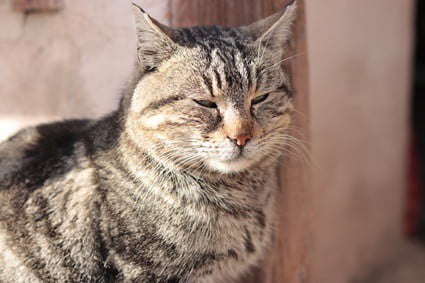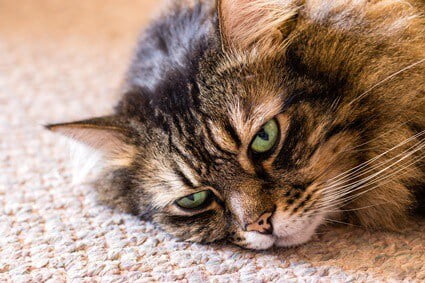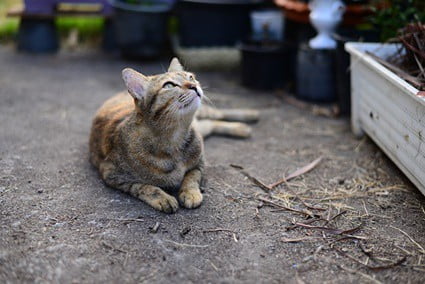A cat’s purring is often misunderstood. Many owners assume that a purring cat is a content cat, and silence is a warning that something is amiss. This may be true, but it is not a hard-and-fast rule.
Some cats never purr because they don’t feel the need to do so. Cats often use purrs to communicate, and your cat may be happy interacting in other ways. However, a sudden cessation of purring could be due to ill health, injury to the throat, or stress and anxiety. Check for any additional behavioral changes alongside feline silence.
There’s no need to worry if a cat stops purring. Frequently, there will be a simple explanation and solution. Any sudden change in purring merits further investigation.
What Does it Mean When a Cat Doesn’t Purr Anymore?
Purring is a sound that many of us associate with contented cats.
While some felines decline to make louder, more prominent noises such as meowing, purring tends to be a constant. As a result, you’d be forgiven for wondering if it is normal for a cat not to purr.
The truth is, there is no black-and-white answer to this question. When assessing feline mental and physical well-being, you’ll need to take a broader look at your cat’s general demeanor and behavior.
A cat that’s not purring is not, by default, an unhappy cat. Equally, a cat that purrs constantly could be attempting to self-soothe due to pain or illness. Purring – or lack thereof – alone is not scientific enough to make a diagnosis.
You should pay attention if your cat is not purring, especially in senior cats. Any sudden shift in behavior, such as a once-vocal cat becoming quiet, merits investigation.
How To Make A Cat Purr
Every cat will have a different trigger for purring, so you may need some trial and error. Usually, one of the following will result in a purring response:
- Petting the cat in favored spots (usually under the chin or behind the ears)
- Talking to your cat. Many cats enjoy conversing with humans in their own way – your cat will likely purr and meow in response
- Offering comfort to the cat, such as a soft cushion or something to knead, or sharing body warmth
- Instigating a playtime with the cat, especially if this is outside a usual scheduled routine
- Feeding a favored meal, ideally with an additional ingredient such as gravy
If your cat doesn’t start to purr in these instances, it doesn’t necessarily mean something is amiss.
Are There Cats That Don’t Purr?
Purring is considered the default sound of cats. In reality, not all cats purr. Much like the meow, the purr is a matter of personal choice for many cats. While some will purr instinctively, far more do so willingly.
The Journal of Zoology explains that purring arises from a cat’s larynx, ensuring that a cat can purr while also making other sounds. In addition, no cat needs to purr. Most do so for their own reasons, often revolving around habit and communication.
Purring is essential to kittens. As cats are born blind and deaf, their mothers emit vibrations to help them find warmth and food, and purring provides these vibrations.
As the kitten grows, it will use purrs to relay messages with fellow felines, especially as cats don’t meow at each other.
Some cats don’t feel the need to purr upon reaching adulthood. This is especially like in single-cat households. If your pet feels that it can make its needs and desires understood in other ways, it may decide not to purr.
A cat that never purrs isn’t necessarily expressing unhappiness. If the cat is not happy in your home, it won’t continue living with you. Take this silence as a compliment. Your cat trusts you enough to communicate in other ways.
My Older Cat Doesn’t Purr Anymore
There is no denying that an old cat not purring could be more concerning than a young cat not purring. As our cats start to show signs of age, we are naturally more concerned for their welfare.
Do cats stop purring when they get older? They do sometimes, but there are reasons for this behavioral change.
Can Cats Lose Their Ability to Purr?
Old age is not enough for a cat to fail to purr.
The muscles in a cat’s larynx used for purring don’t weaken or deteriorate over time as standard. If your cat has lost the ability to purr in later life, it will be due to physical injury or illness.
Can Cats Forget How to Purr?
It is possible that a geriatric (typically aged 15 or over) cat will forget how to purr.
As discussed, some cats purr through instinct. Others make a conscious effort to do so. If your cat is getting on in years, this effort may become increasingly difficult to enact.
As cats age, their brains age with them. As a cat reaches the age of 15, senility becomes much likelier. This is known as feline cognitive dysfunction.
A cat living with FCD could forget how to purr. As per Veterinary Clinics of North America: Small Animal Practice, memory deficiency is one of the symptoms.

Why is My Cat Not Purring?
Living with a muted cat can be disconcerting. This is especially likely if your cat has suddenly ceased purring. While a lack of verbalization is not always a medical emergency, something could be amiss with your cat.
Satisfaction
As discussed, many cats purr as a form of communication. This doesn’t necessarily mean satisfaction, though. Some cats will opt to purr to get what they want, falling into contented silence once this is achieved.
Take a hungry cat, for example. This animal may approach its owners and purr, thus announcing its presence. As owners, we are hardwired to notice this purring. We’ll give the cat attention, allowing it to behave performatively and express its desires.
If the purring stops abruptly once you open a food sachet or offer a treat, you have your answer. Now the cat has what it wants, it does not need to purr any further. Expect the sound to start again next time your pet wants a snack or some petting.
Desire for Privacy
Similar to the above, some cats will stop purring to cease attention. If you’ve ever asked yourself, “why doesn’t my cat purr when I pet it?” it could be due to an aversion to handling.
We have established that purring is optional, and many cats use the sound to announce their presence. If the cat is not purring, it may wish to be left alone. Your pet may be concerned that you’ll mistake purring for a request for handling and physical interaction.
While petting your cat, do not listen out for purring and assume that’s a sign of contentment. The cat may be tolerating the experience against its will and purring to self-soothe.
Focus on other sounds – most notably hissing – and body language, such as squirming and seeking escape. These will be more prominent if your cat is otherwise silent. Let a non-purring cat approach you for attention.
Stress and Anxiety
Cats are easily distressed, especially by deviations in routine. If you have rearranged your home, brought a new resident into the house, or otherwise changed something in your cat’s life, it will need time to adapt.
All cats handle this struggle differently. Some will become needy, demanding more of an owner’s attention through unique verbalizations that can’t be ignored. Current Biology refers to this as “the cry embedded within the purr.”
Not all cats will take such an approach, though. It’s just as likely – if not more so – that a stressed and anxious cat will attempt to make itself invisible. That means staying out of the way of humans and not drawing attention to itself through noise, including purring.

Ill Health
An element of purring that is less well-known is its healing properties.
As explained by the Journal of the Acoustical Society of America, cat purrs create vibrations of frequencies between 25 and 150 Hz. These frequencies are believed to heal wounds and soothe pain.
This is why cats purr to calm themselves, especially if feeling under the weather. An unwell cat will not seek out an owner and ask for help. Instead, the cat will hide and wait for the distress to pass. It does not want anybody, or anything, to know it is vulnerable.
This means that the cat may also stop purring. The cat is worried that purring will reveal discomfort – and in the mind of a feline – weakness. If your cat displays other strange habits in addition to not purring, seek advice. It may have a throat condition, such as laryngitis, or avoiding purring due to an unrelated ailment.
The most disturbing behavior will be refusing to eat or drink, in addition to excessive hiding. Sleeping more than usual and showing reluctance to play or roam can also be signs of ill health in a silent cat, though.
Injury
If your cat has suddenly fallen silent, an injury to the throat or vocal cords could be blamed. Listen out for other sounds that your cat makes. If it’s entirely mute – and this is unusual – investigate physical misadventure.
Check for any wounds. If your cat wanders outside, it may have endured unfriendly encounters with other animals. As discussed, cats are skilled at hiding ailments. It will not seek sympathy for any cuts around the neck.
If you cannot find traces of blood or claw marks, check for swelling. Your cat may have bruised its throat, neck, or windpipe. This will typically be an impact injury, or the cat may have grown trapped in a small space and hurt itself trying to regain freedom.
This won’t always be easy. Your cat may not tolerate handling this way, whether hurt or in perfect health. If it is uncharacteristically reluctant to interact, though, seek veterinary advice.
Do Cats Stop Purring When They are Dying?
If your older cat isn’t purring and lethargic, you will understandably be worried that it is reaching the end of its lifespan. This isn’t necessarily the case. In fact, a cat is likelier to purr in this instance.
Nobody can say with certainty how aware cats are of their own mortality. They appear to have some understanding, as many dying cats will find a quiet place to be ill.
A dying cat will likely know that its organs are failing, struggle for breath, and experience other ailments. As a result, a cat will likely purr with increasing frequency before passing away, seeking to make the transition as calm as possible.
If your cat has stopped purring suddenly, it’s not necessarily a significant concern. Check for other behavioral changes.

